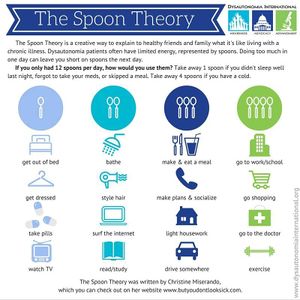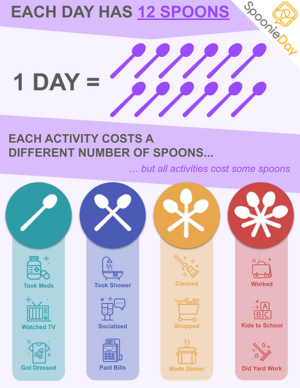Spoon theory
The spoon theory is a way of describing the experience of chronic illness and its limitations using a metaphor.[1][2] It was created by Christine Miserandino, who has lupus, an invisible illness which causes chronic fatigue, chronic pain and many other symptoms that limit her energy levels and ability to do everyday things.[1]
How spoon theory works[edit | edit source]


- A person has roughly the same amount of energy each day.
- Each unit of energy is represented by a spoon.
- Healthy people have more spoons (energy) than those with an illness that causes chronic fatigue.
- Some activities cost more spoons than others.
- A person with a fatiguing chronic illness needs to make decisions about which activities to spend their limited number of spoons (energy) on -- the illness stops them doing many things they want to do.
- The chronic illness means that if the person does too much in the morning, they will not have enough spoons left for the afternoon or evening.
- The chronic illness may mean that a person can do something in the morning OR on the afternoon - but NOT both. They may seem inconsistent because their energy levels and number of spoons fluctuate.
- A healthy person does not need to plan how to spend their spoons, because they do not have an illness that limits them[1][2].
Spoons and energy[edit | edit source]
| Activity | Spoons |
|---|---|
| Get up | 1 0 |
| Get dressed |
1 0 |
| Hair |
1 0 |
| Makeup |
1 0 |
| Take shower |
2 0 |
| Tidying after getting ready |
0.5 0 |
| Trip to chemist |
3 0 |
| Cleaning face |
1 0 |
| Making dinner |
3 0 |
| Total spoons |
Example: 12 spoons per day[edit | edit source]
In the "Spoon Theory Poster" above, a person with 12 spoons per day could use them to:
- get up (1 spoon),
- get dressed (1 spoon),
- take medication (1 spoon),
- and drive (3 spoons) to work,
- work (4 spoons),
which would be 10 spoons. They would then have two remaining spoons, which would not be enough to cook a meal (3 spoons), visit the doctor (4 spoons), socialize (3 spoons) or do light housework (3 spoons). But they would have just enough energy to watch TV (1 spoon) or read (2 spoons). If they wanted to cook and eat a meal or socialize, they could plan those on days when they are not doing high energy or spoon-depleting activities, such as driving or working.
This careful planning is necessary for someone with a chronic illness to help avoid over-exertion, but is not necessary for a healthy person, who likely has enough spoons to do almost any combination of activities.
Example: a healthy person's day off work: 19 spoons[edit | edit source]
The person:
- gets up and dresses (1 + 1 spoons)
- has a shower (2 spoons)
- styles their hair after the shower (2 spoons)
- drives (3 spoons) to the supermarket
- buys food (3 spoons)
- cooks and eats a meal (3 spoons)
- watches some TV (1 spoon)
- then makes plans and socializes (3 spoons)
This is a total of 19 spoons. This might be a typical "relaxing" day for a healthy person, but is far beyond the capability of the person with only 12 spoons per day, who is probably only able to work part-time (if at all).
Example: 4 spoons per day[edit | edit source]
A person with more severe chronic fatigue, but who still has more energy than those with very severe ME/CFS. This would be enough to:
- get up (1 spoon)
- get dressed (1 spoon)
- watch TV (1 spoon)
But it would be impossible for them to visit the doctor (4 spoons) because they would have to get up first (1 spoon) and get dressed (1 spoon). It would also be impossible to get up (1 spoon) and cook and eat a meal (3 spoons) if they also needed to take medication (1 spoon) or slept badly (1 less spoon than normal).
Visiting the doctor or cooking would be more than the energy available, leading to significant post-exertional malaise which could last days.
Why use spoons?[edit | edit source]
Most people start the day with an unlimited amount of possibilities, and energy to do whatever they desire, especially young people. For the most part, they do not need to worry about the effects of their actions.
So for my explanation, I used spoons to convey this point. I wanted something for her to actually hold, for me to then take away, since most people who get sick feel a “loss” of a life they once knew.
If I was in control of taking away the spoons, then she would know what it feels like to have someone or something else, in this case Lupus, being in control.
Spoon theory, ME/CFS, chronic pain, and chronic illnesses[edit | edit source]
Spoon theory is a useful analogy to explain how people who have long-term chronic fatigue or pain adapt their lives to keep symptoms more manageable.[2] Many people with chronic fatigue syndrome have adopted the terminology used in the spoon theory to explain their limited energy levels and the effects of their fatigue or other symptoms to healthy people.
ME/CFS is an invisible illness, and the level of fatigue can fluctuate during the day, often depending on how many spoons of energy have already been used that day, or in previous days. This makes it difficult for healthy people to understand, and some people may be judged as "lazy" for being unable to consistently do everyday activities,[2] for instance being able to cook only on certain days or only once per day due to post-exertional malaise or other symptoms. There is no suggested guide for using spoon theory with ME/CFS and it may not represent the impact of all symptoms.
Similarly, those with chronic migraine,[citation needed] and other chronic pain syndromes[citation needed] have found this analogy useful to explain to their friends, family, co-workers, teachers, and others, how their energy and capabilities are limited day-to-day, and how they must plan carefully to avoid running out of spoons before the end of the day.[citation needed]
Being a spoonie[edit | edit source]
Some people with ME/CFS, chronic migraine, or other chronic illness sometimes refer to themselves as spoonies, meaning people who have "a very limited units of energy that must be carefully rationed".[3]
Pacing and spoon theory[edit | edit source]
Spoon theory can be used both to explain the limitations of chronic fatigue, chronic pain, or other complex illnesses, and as a simple method of pacing, which involves managing activity levels in order to prevent harmful over-exertion.[citation needed]
Notable studies[edit | edit source]
No studies have been carried out on the effectiveness of using spoon theory either to explain the effects of a chronic illness, or as a method of pacing to help avoid the post-exertional malaise caused by over-exertion.
Articles[edit | edit source]
- 2013, Reclaiming ‘Chronic Illness’: An introduction to the Chronic Illness Inclusion Project[3] - Centre for Welfare Reform
Blogs[edit | edit source]
- The Spoon Theory - Christine Miserandino
- Explaining low stamina levels - with spoons - BBC news, Ouch blog
- Spoon theory have people the wrong idea about chronic illness
- Spoon Theory calculator game - Tumblr
- Stop appropriating the language that describes my illness - Naomi Chainey, Sydney Morning Herald
- Spoonie Day - The application Spoonie Day's blog
Learn more[edit | edit source]
- The Spoon Theory - Christine Miserandino
Applications [edit | edit source]
- Spoonie Day - Spoonie Day Available in the iOS, Google Play, and as a Web App
See also[edit | edit source]
References[edit | edit source]
- ↑ 1.0 1.1 1.2 Miserandino, Christine (2003). "The spoon theory". But You Don't Look Sick.
- ↑ 2.0 2.1 2.2 2.3 https://www.bbc.co.uk/news/blogs-ouch-22972767
- ↑ 3.0 3.1 https://www.centreforwelfarereform.org/uploads/attachment/617/reclaiming-chronic-illness.pdf

